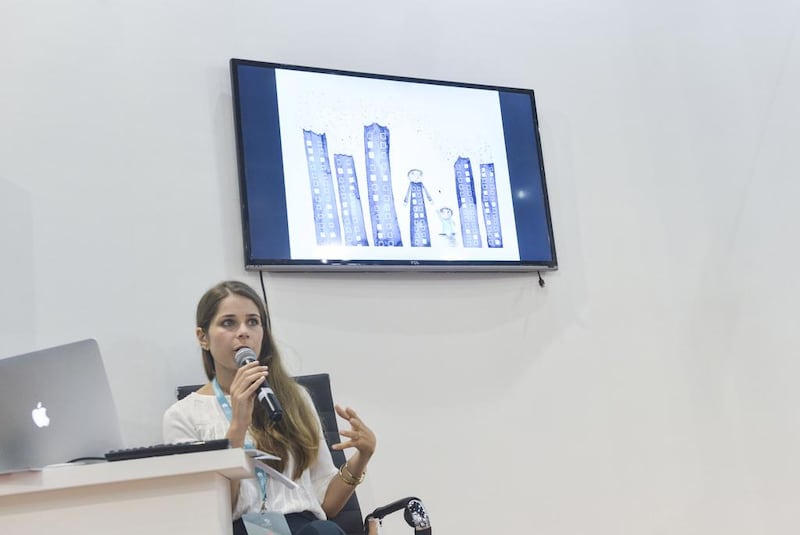Most of the stories we hear about Damascus these days are tales of despair from news bulletins about bombings, water shortages or failed peace efforts.
But to Syrian children's writer and illustrator Nadine Kaadan, who spoke on Friday at the Abu Dhabi International Book Fair, the city is always a source of inspiration. With her first book in English – The Jasmine Sneeze, about a cat who sleeps in the city's courtyards and is allergic to the plant – she sheds light on another side of the city she called home until six years ago.
“It’s the oldest capital city in the world and its aesthetic is unique,” says Kaadan, who now lives in London. “In my subconscious as a child, the fountains in the courtyards, the archways, and the summer nights were so beautiful.”
These aspects of the city feature in Kaadan’s illustrations, as does the sunlight.
“The contrast between the shadow in the narrow alleyways, and the bright sunlight of the courtyards really struck me,” she says. “It’s often dark and grey in London and I miss that orange light.”
Kaadan brings her memories of Damascus to life by layering watercolours in the illustrations in her 14 children’s books.
Cats and pigeons are so common in Damascus that Kaadan refers to them as “honorary citizens”.
"In The Jasmine Sneeze, the cats have a karaoke party, because at night, the cats of Damascus are always meowing loudly," she says.
Kaadan also draws inspiration from indigenous folk tales. Although they have never been officially documented, such tales are well known to the city’s citizens.
“Although we don’t like to admit it, people from Damascus still believe in these tales,” she adds.
When war broke out, Kaadan's style and perspective changed. Her book Tomorrow, which features many dark illustrations, is about Yazan, a boy who stops going to school and playing with his friend next door.
“People in Damascus at that time were suffering from anxiety and confusion, which was reflected in my artwork,” she says. “Parents were glued to their television sets. Yazan doesn’t understand what’s happening. His parents tell him there’s a war going on, but they also paint a peaceful place for him to imagine going to.”
Kaadan did not expect her book to have the effect it did.
“My storytelling took on a therapeutic dimension – children wanted to tell me their own stories,” she says. “Storytelling sessions turned into moments for them to express their fears.”
Kaadan asked children to describe their feelings by drawing them. The images showed bombs raining down and homes ablaze.
Kaadan asked a child psychologist for help deciphering what these pictures revealed about the children’s state of mind.
“He pointed out that in all the drawings, the people were drawn really small, which is a huge sign of anxiety,” she says. “The bombs are big in comparison. But on a hopeful note, they’ve still drawn the sun, clouds and birds in the sky, which is a sign of hope in their hearts.”
Fifth day’s highlights
Narrating Rome
Italian author Edorado Albinati is on a career high. He is at the fair to discuss his ambitious book, The Catholic School, a mammoth 1,000-page tome based on the notorious real-life murder of two young girls that shocked Rome in the 1970s. Albinati won one of the country's highest literary accolades, the prestigious Premio Strega, for the book last year. • 12pm at the Discussion Sofa
Creative Writing in the UAE: Arabic or English: A controversial subject in local literary circles is how young Emiratis are increasingly using English when they write. Is this a natural progression in a globalised world or will local literature suffer as a result? Emirati writer and motivational speaker Fatima Al Mualla will appear as part of the panel discussion. • 6.30pm at the Discussion Sofa
Arabic poetry to steal the show
The fair often saves the music and art performances for the final session of the day. Tonight is no different, with a cavalcade of Arab poets taking the stage to read selections from their works. Names to look out for include Emirati poetry stalwart Adel Khozam, Palestine’s Nasr Jamil Shaath and Jordan’s Maha Alotum. • 7.30pm at Al Multaqa Literary Salon
• The Abu Dhabi International Book Fair runs until Tuesday at the Abu Dhabi National Exhibition Centre. www.adbookfair.com
artslife@thenational.ae





